About this Report
This Sustainability Report should be read together with Axiata Group Berhad’s Intergrated Annual Report 2017 for a comprehensive overview of the Group’s financial and non-financial performance for the year under review.
This standalone Sustainability Report is a comprehensive document detailing the management of our business impacts on Economic, Environmental and Social (EES) issues. Our Sustainability Report contains detailed information about Axiata’s Sustainability Framework, anchored on our 4P approach; Beyond Short Term Project, Nurturing People, Process Excellence & Governance, and Planet and Society. The 2017 edition is the fifth volume in our “Commitment to Development” series, which has been following the Global Reporting Initiative’s G4 (GRI-G4) guidelines since 2013.
Report Boundary
The 2017 Axiata Sustainability Report covers the sustainability performance of our Group Corporate Centre (CC), and key operating companies. This includes Celcom (Malaysia), XL (Indonesia), Smart (Cambodia), Robi (Bangladesh), Dialog (Sri Lanka), Ncell (Nepal), and edotco Group which covers their operations in Malaysia, Cambodia, Sri Lanka, Bangladesh, Myammar and Pakistan. This accounts for 46% of the Group’s gross revenue. The report excludes Axiata Digital Services, Axiata Business Services, wholly owned and non-wholly owned subsidiaries, associate companies (M1 & Idea), and companies that are in the process of being disposed (Multinet).
This report discusses the sustainability of the Group as a whole. The 2017 volume of our Sustainability Report differs from past years’ in that a focused effort was made to harmonise and integrate the reporting methods used throughout the Group, including our OpCos. We note that our OpCos’ operating environments may vary significantly from one market to the next, but we have nevertheless made the attempt to harmonise general reporting areas. Our OpCos are encouraged to produce their own standalone sustainability report to provide more insight into their respective sustainability management and context.
Report Scope
Axiata Group’s 2017 Sustainability Report provides detailed disclosure of the Group’s management of EES risks and opportunities for the financial year ended 31 December 2017. The report addresses 23 material aspects covering 33 identified indicators. Our materiality mapping methodology is specified on page 12 of this report.
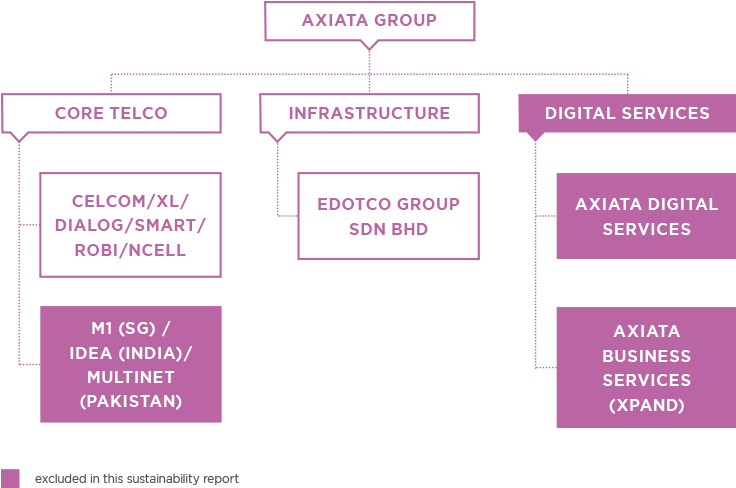
Assurance
Selected subject matter within this Sustainability Report has been independently assured by Deloitte PLT (Deloitte) at a limited level as defined by ISAE3000. For more information on the subject matter and scope of assurance, please refer to Deloitte’s assurance statement on pages 80 and 81.
As part of our process improvement, we conducted a review of assurance across our reporting units. Among our key operating companies only Dialog conducts a third party independent assurance of their report. We are committed to work with our OpCos to progressively assure material sustainability performance data in future reports.
Stakeholder Engagement
Axiata’s ability to create value relies on successful interactions with our diverse groups of stakeholders. Our stakeholder base cuts across our Group presence in ASEAN and South Asia. Each of our stakeholder groups significantly impact our regional business which sees us within multiple roles including being an employer, communications provider, technology innovator and infrastructure developer.
In order to clearly understand our various stakeholder groups’ concerns and identify the most effective response to issues raised, we conduct continuous, consistent and targeted stakeholder engagement sessions. The outcomes of these sessions informs our material issues, our strategy development, and our risk management.
| Stakeholders | Why They Are Important | How We Engage With Them | Subjects Raised | Axiata’s Response |
|---|---|---|---|---|
Customers |
Our customers are key contributors to our success as a commercial enterprise. Through their purchases of our products and services, they provide us a direct gauge of the efficiency and effectiveness of our product and service portfolio. To maintain high levels of customer satisfaction, we need to fully understand our customers needs. |
|
|
Driving efficiencies and innovations through investments in new technologies Establishing strategic ties with “Over-the-Top” (OTT) or other digital product developers to create products and services that meet evolving customer needs, increase the Group’s share of customers’ wallets and rebuilds customer loyalty |
Employees |
As our human capital base, our employees are a key resource for all our activities in the realisation of our vision to become a New Generation Digital Champion by 2021. Employee satisfaction is a top priority, and we continuously strive to ensure that morale remains high in all our business units. |
|
|
|
Shareholders |
As owners of the Company, shareholders provide us with the financial capital needed to sustain our growth. Consequently, they are entitled to receive a return on their investment and to be apprised of developments in the Company. They are also entitled to express their views on the Company or to share any concerns about the way the business is being run. |
|
|
|
Regulators & Government |
Our regulators and authorities specify the laws and regulations that determine the scope and extent of our activities in our respective countries of operation. They provide our OpCos access to spectrum and operating licences, and impose regulatory measures with potential cost implications for our Group. We maintain open channels of communication with them, as they are best positioned to provide advice and clarification in relation to our operations and obligations. |
|
|
|
Suppliers |
Our broad range of suppliers support all aspects of our business. Our supplier chain covers vendors supplying infrastructure components to professional corporate service providers. They are our key enablers as providers of vital services. It is important that we maintain a professional relationship of trust where views from either party can be freely exchanged, as well as to apprise them of changes to our procurement policy and to seek relevant feedback and information from them. |
|
|
|
Media |
The media is our primary channel of communicating with the public at large. They play a critical role in sharing information such as our Company’s financial performance and changes to our products and services, as well as information on our CR programmes. They also provide us with valuable feedback on any general concerns or views that the public may have about us. |
|
|
|
Community |
Through our Corporate Responsibility (CR) projects, we are contributing to the ongoing socioeconomic development of our communities in our operating countries. This present us with the opportunity to ascertain how we can make meaningful impacts on their lives and improve our products and services to better serve them. |
|
|
|
Management of Material Risks and Opportunities
Axiata uses an integrated assurance methodology to manage our risks and opportunities, to catalyse long-term value creation. The following outlines our material risks, along with our Group’s exposure and potential impacts, and identifies mitigation measures which are linked to our Axiata 3.0 strategy and future opportunities.
| Risk Category | Mitigation Measures |
|---|---|
Financial Risk |
|
Market Risk |
|
Regulatory Risk |
|
Cyber Risk |
|
Digital Risk |
|
Operational Risk |
|
Geopolitical Risk |
|
Strategic Risk |
|
Investment Risk |
|
People Risk |
|
Technology Risk |
|
Governance & Integrity Risk |
|
List of Abbreviations
‘Over-the-Top’ (OTT)
Annual General Meeting (AGM)
Axiata Digital (AD)
Axiata Digital Innovation Fund (ADIF)
Axiata Procurement Centre (APC)
Axiata Treasury Management Centre (ATMC)
Axiata Young Talent Programme (AYTP)
Badminton Association Malaysia (BAM)
Base Transceiver Station (BTS)
Bombay Stock Exchange (BSE)
Board Audit Committee (BAC)
Business Continuity Management (BCM)
Business Development Programme (BDP)
Capital Expenditure (Capex)
Compound Annual Growth Rate (CAGR)
Connected Woman Commitment Initiative (CWCI)
Corporate Responsibility (CR)
Corporate Social Responsibility (CSR)
Cyber Security Operations Centre (CSOC)
Cyber Security Steering Committee (CSSC)
Department of Education (DOE)
Department of Hydrology & Meteorology (DHM)
Disaster and Emergency Warning Network (DEWN)
Disaster Readiness Programme (DRP)
edotco group (e.co)
Employee Engagement Survey (EES)
Enterprise Risk Management (ERM)
Environmental, Social and Governance (ESG)
Economic, Environmental and Social (EES)
First Line Manager (FLM)
General Packet Radio Service (GPRS)
Get Out of Diesel (GOOD)
Gigajoule (GJ)
Global Reporting Initiative (GRI)
Government-Linked Company (GLC)
Greenhouse Gas (GHG)
Gross Domestic Product (GDP)
Gross Value Added (GVA)
Group Accelerated Development Programme (GADP)
Group Risk Management Committee (GRMC)
GSM Association - An association of mobile operators
and related companies devoted to supporting the standardising,
deployment and promotion of the GSM mobile telephone system (GSMA)
GSMA’s Humanitarian Connectivity Charter (HCC)
High Throughput Satellite (HTS)
Human Resources (HR)
Improvement, Innovation, Investment & Impact (4i)
Info-communications Media Development Authority (IMDA)
Information and Communication Technology (ICT)
International Finance Corporation (IFC)
International Long Distance (ILD)
International Standard on Assurance Engagement (ISAE)
Internet Data Centre (IDC)
Internet-of-Things (IoT)
Kampung Tanpa Wayar (KTW)
Keretapi Tanah Melayu (KTM)
Key Performance Indicators (KPI)
Kilowatt (kW)
Local Partner Development Programme (LPDP)
Majlis Amanah Rakyat (MARA)
Malaysian Communication and Multimedia Commission (MCMC)
Malaysian Sustainability Reporting Awards (MasRA)
Market Capital (Market Cap)
Memorandum of Understanding (MoU)
Ministry of Higher Education (MoHE)
Minority Shareholder Watchdog Group (MSWG)
Multimedia Development Corporation (MDEC)
Narrowband Internet-of-Things (NB-IoT)
National Centre for Educational Development (NCED)
National Long Distance (NLD)
National Secondary School Leadership Development Programme (NSS)
National Stock Exchange (NSE)
Net Promoter Score (NPS)
Next Generation Nationwide Broadband Network (NGNBN)
Occupational Health and Safety (OHS)
One Laptop per Child (OLPC)
One Village One Product Programme (OVOP)
OpCo Accelerated Development Programme (OADP)
Operating Companies (OpCos)
Operating Expenditure (Opex)
Personal Accident (PA)
Personal Data Protection Act (PDPA)
Profit After Tax (PAT)
Pusat Internet 1Malaysia (Pi1M)
Request for Proposals (RFP)
Rubber Industry Smallholders Development Authority (RISDA)
Senior Leadership Team (SLT)
Short Messaging System (SMS)
Skim Latihan 1Malaysia (SL1M)
Small and Medium Enterprises (SME)
Standard & Industrial Research Institute of Malaysia (SIRIM)
Strategic Partners Development Programme (SDP)
Supplier Performance Management (SPM)
Sustainability Engagement Index (SEI)
Taylor Nelson Sofre (TNS)
Technical Vocational Education & Training (TVET)
Telekom Malaysia Berhad (TM)
Telekom Malaysia International (TMI)
Uncompromising Integrity. Exceptional Performance (UI.EP)
University Leadership Development Programme (ULDP)
Value Added Services (VAS)
Vendor Development Programmes (VDP)
Venture Capital (VC)
Year Over Year (Y-o-Y)
Young CEO Development Programme (YCDP)
Aspect Boundaries
The table below provides an overview of our material issues and their corresponding material aspects. The table also illustrates the areas of our operations in which these material aspects apply.
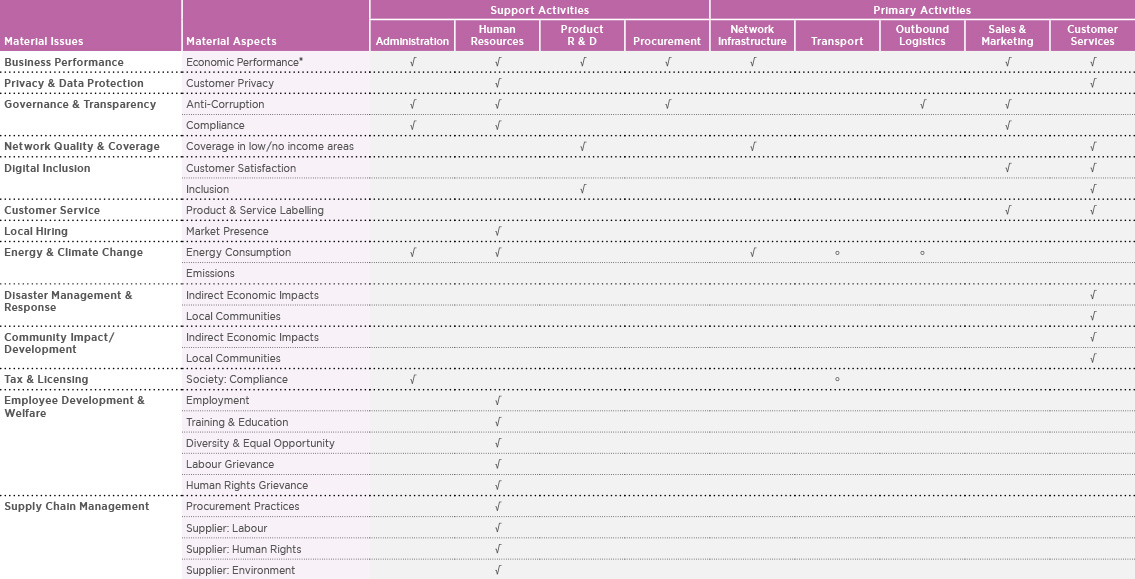
Notes:
√ This segment is within the boundary of the concerned aspect and we have reported on it
 This segment is within the boundary of the concerned aspect, but we have not reported on it due to the unavailability of information for the reporting cycle
This segment is within the boundary of the concerned aspect, but we have not reported on it due to the unavailability of information for the reporting cycle
* Reported in the Axiata Annual Report 2016
Data In Numbers
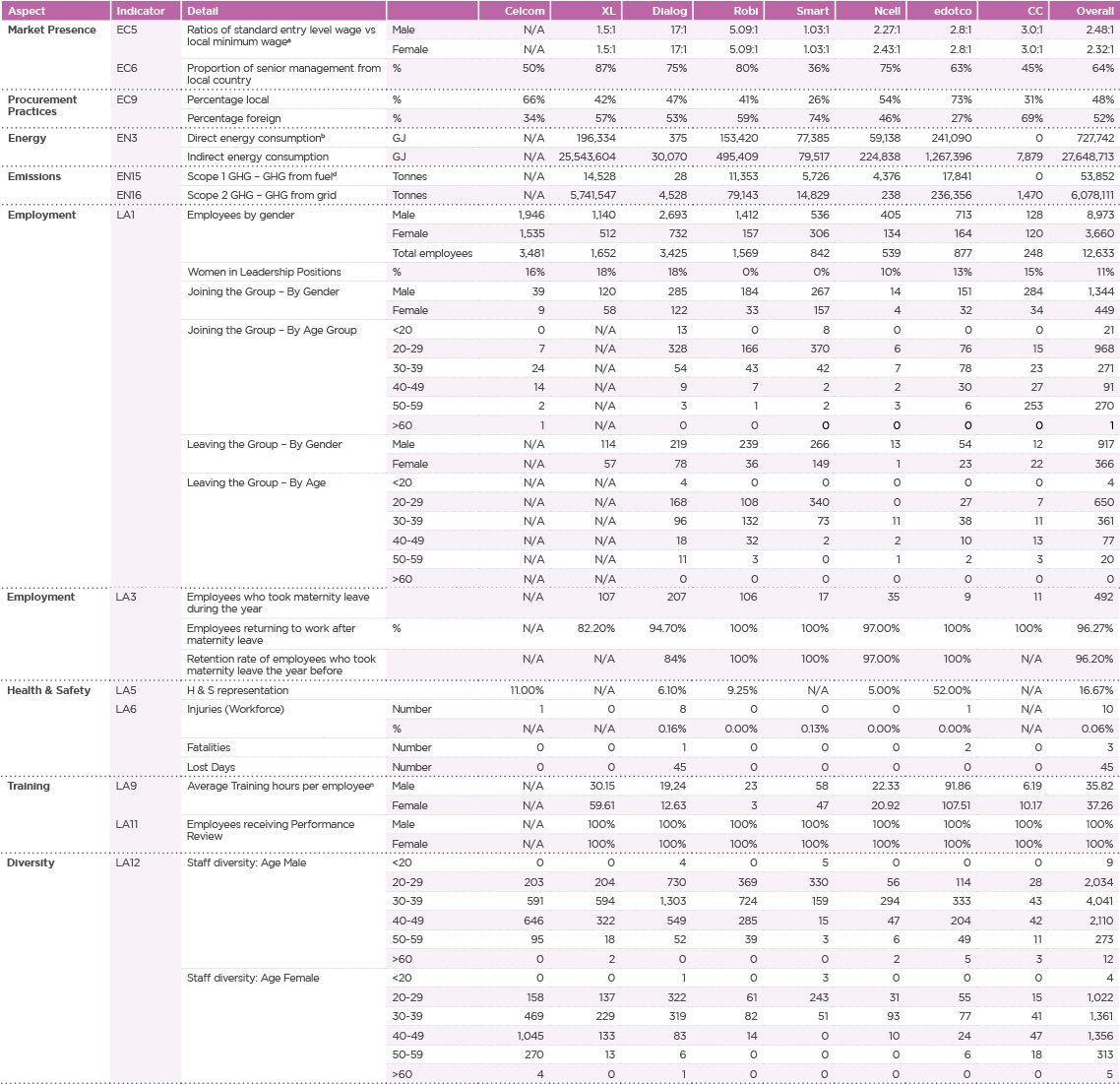
GRI Content Index
Custom Content Index - ‘In Accordance’ Core
This Content Index provides an overview of the G4 Standard Disclosures made in this report and the Axiata Integrated Annual Report 2017.
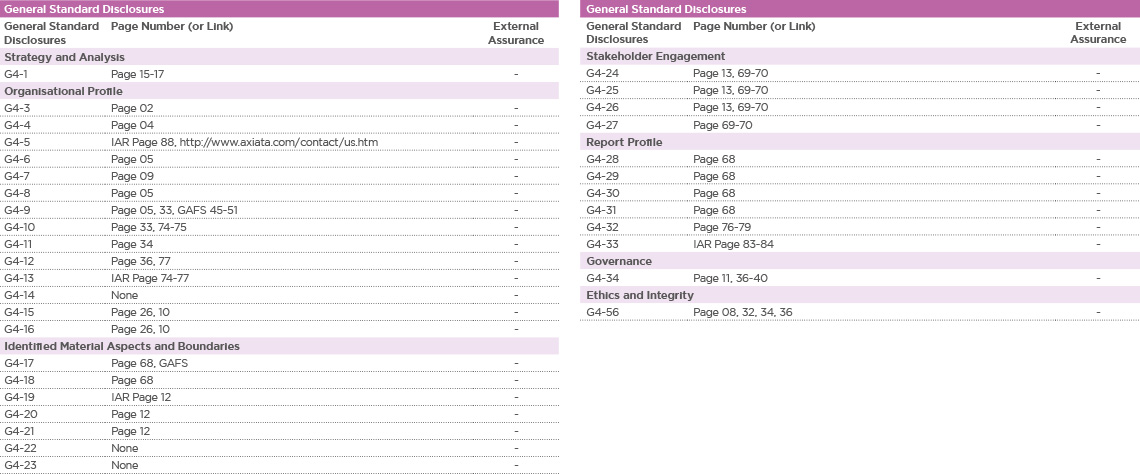
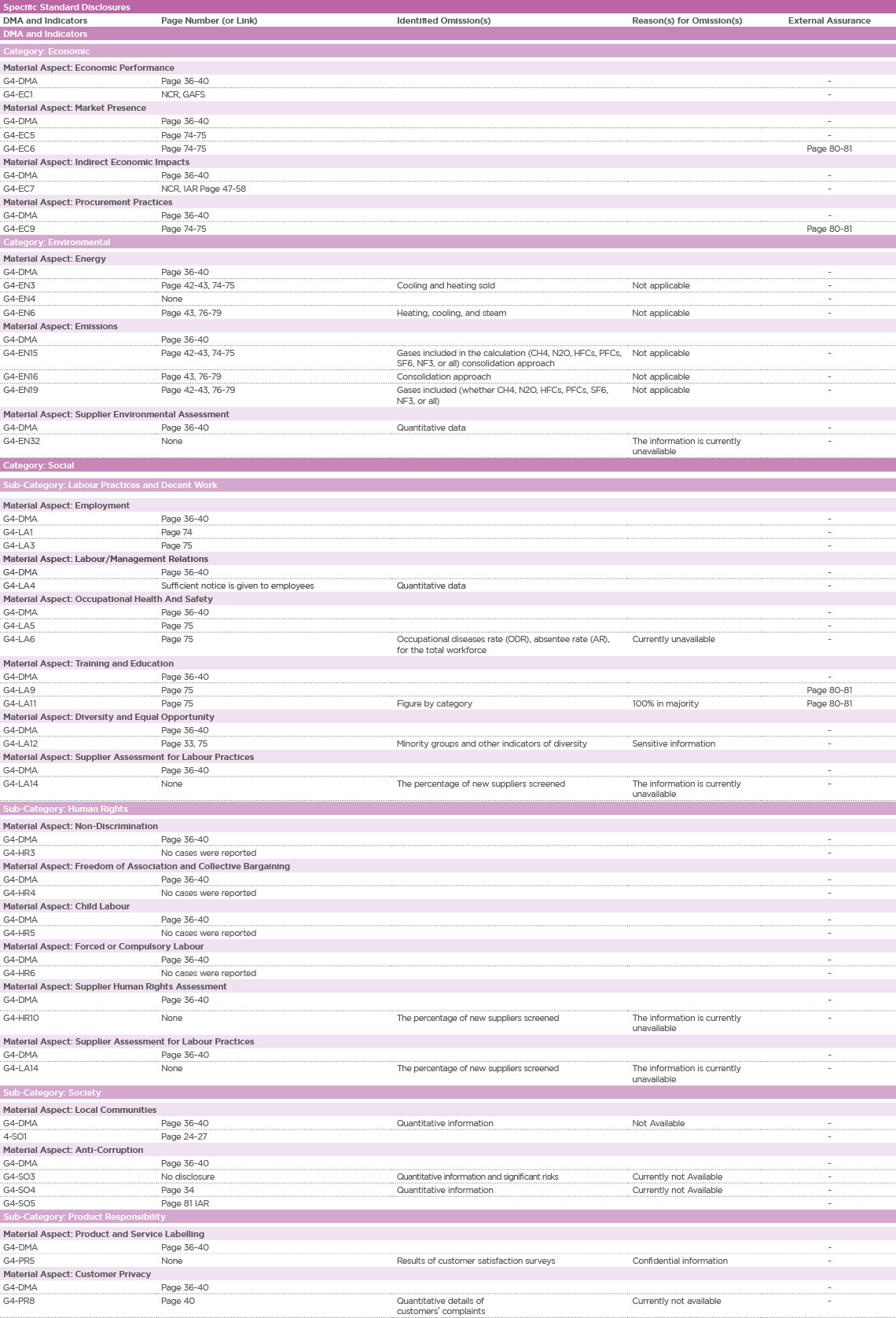
Assurance Statement
Independent Limited Assurance Report On Axiata Sustainability Report For The Financial Year Ended 31 December 2017
To The Board of Directors Axiata Group Berhad (“Axiata”)
Scope of our work
Axiata Group Berhad has engaged Deloitte PLT (LLP0010145-LCA) to perform limited assurance procedures for the Corporate Centre (“CC”) on selected Subject Matter (“the Subject Matter”) for the financial year ended 31 December 2017 presented in the Axiata Group Berhad’s Sustainability Report 2017, in accordance with the reporting criteria (“the Criteria”).
Subject Matter
The selected Subject Matter related to the Corporate Centre chosen by Axiata comprises:

Note: All data points refer to the Corporate Center only.
Criteria
The selected Subject Matter above are included in the Axiata Group Sustainability Report 2017 and has been assessed according to the Sustainability Reporting Guidelines version 4 –Global Reporting Initiative (GRI-G4) - Core option.
Basis of our work and level of assurance
We carried out a limited assurance engagement in accordance with International Standard for Assurance Engagements 3000 (revised) “Assurance Engagements Other Than Audits or Reviews of Historical Financial Information” (‘ISAE 3000’). A limited assurance engagement consists of making enquiries, applying analytical procedures, reviewing the process and systems used to compile the Subject Matter and gathering other evidence to enable us to obtain a meaningful level of assurance. The procedures performed depend on our judgement and take into account the risk of material misstatement in the Subject Matter, whether due to fraud or error.
The procedures performed in a limited assurance engagement vary in nature, and are less in extent than for a reasonable assurance engagement. As a result, the level of assurance obtained in a limited assurance engagement is substantially lower than the assurance that would have been obtained had we performed a reasonable assurance engagement.
We have complied with the independence and other ethical requirements of the Code of Ethics for Professional Accountants issued by the International Ethics Standards Board for Accountants, which is founded on fundamental principles of integrity, objectivity, professional standards and due care, confidentiality and professional behaviour.
The firm applies International Standard on Quality Control 1 and accordingly maintains a comprehensive system of quality control including documented policies and procedures regarding compliance with ethical requirements, professional standards and applicable legal and regulatory requirements.
Inherent limitation
Inherent limitation exists in all assurance engagements due to the selective testing of the information being examined. Therefore, fraud, errors and non-compliance may occur and not be detected. Additionally, non-financial data may be subject to more inherent limitations than financial data, given both its nature and the methods used for determining, calculating and estimating such data.
Key assurance procedures
Considering the risk of material error, we planned and performed the work to obtain all the information and explanations considered necessary to provide sufficient evidence to support our assurance conclusion.
Our assurance procedures included, but were not limited to:
- Gaining an understanding of Axiata’s business and approach to sustainability.
- Visiting Axiata’s Corporate Centre.
-
Interviewing management at Axiata’s head office, including the sustainability team to understand:
- The process for stakeholder engagement across the organisation;
- The process for determining material issues and reporting against them; and
- The activities relating to the sustainability priorities during the reporting period.
-
Conducting limited assurance procedures for the six sustainability performance indicators by:
- Checking that methodologies have been correctly applied;
- Performing analytical review procedures to support the reasonableness of the data;
- Performing testing of selected data on a sampling basis;
- Identifying and testing assumptions supporting calculations; and
- Assessing the reliability of specific sustainability performance information.
Management’s responsibilities
The management of Axiata (‘Management’) is responsible for the preparation of the Sustainability Report which is ‘in-accordance’ with the Sustainability Reporting Guidelines issued by the Global Reporting Initiative (GRI-G4) Core option. Management’s responsibility also includes the collection, preparation and presentation of the Subject Matter in the Report in accordance with the above Criteria, and for maintaining adequate records and internal controls that are designed to support the sustainability reporting process.
Our responsibility
Our responsibility is to independently express a limited assurance conclusion on the selected Subject Matter in accordance with the Criteria. Our assurance engagement has been planned and performed in accordance with ISAE 3000.
Limitation of use
This report has been prepared in accordance with our engagement terms, solely for the Board of Directors of Axiata for the purpose of reporting on the select Subject Matter set out within the Axiata Sustainability Report 2017. We do not therefore accept or assume any responsibility for any other purpose of to any other person or organisation. Any reliance that any such third party may place on our report is entirely at their own risk. No statement is made as to whether the criteria are appropriate for any third party purpose.
We have not performed any work in respect of sustainability information published elsewhere, including Axiata.com’s website.
Our assurance opinion
Based on the work described above, nothing has come to our attention that causes us to believe that the selected Subject Matter for the year ended 31 December 2017 included in the Axiata Group Berhad’s Sustainability Report 2017 has not been prepared, in all material respects, in accordance with the Criteria.
Deloitte PLT (LLP0010145-LCA)
Kuala Lumpur, Malaysia
5 April 2017